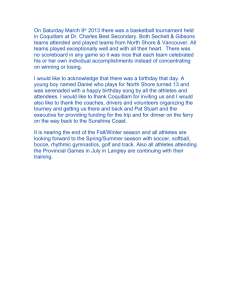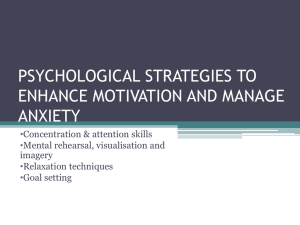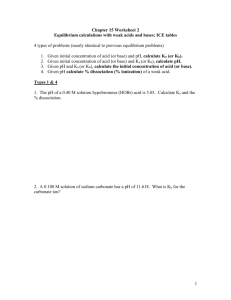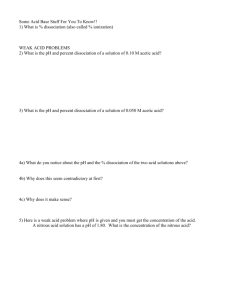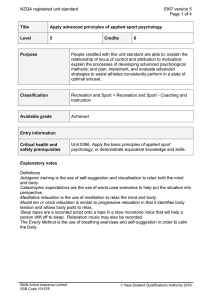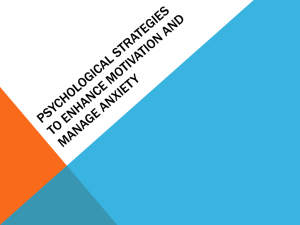Running and mental preparation
advertisement
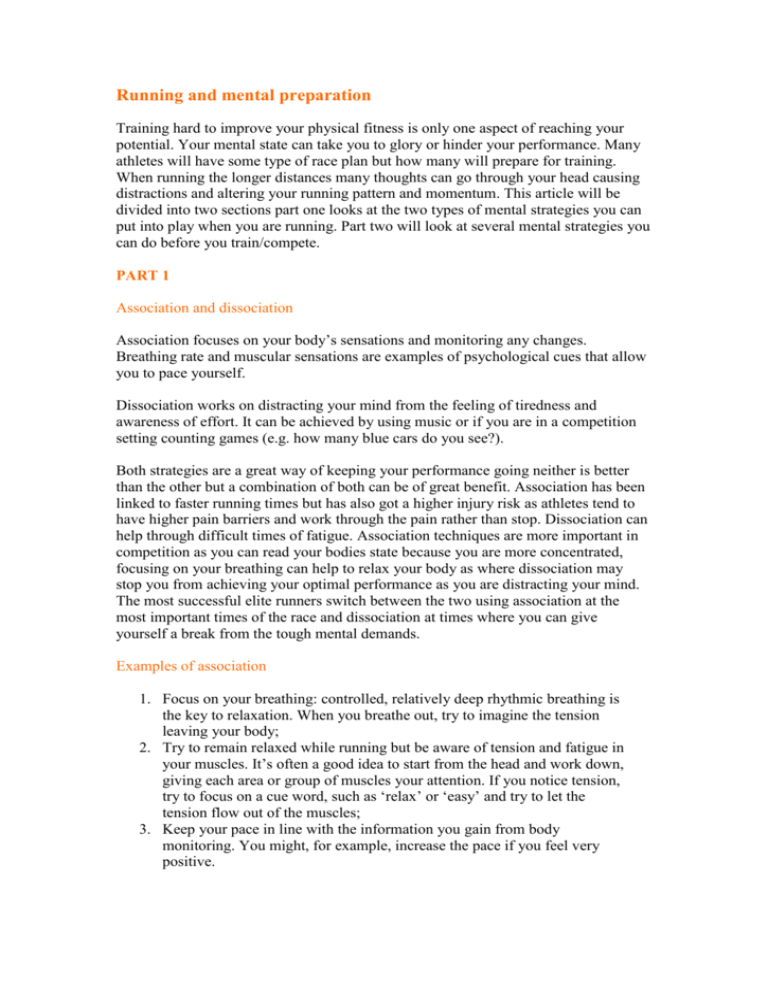
Running and mental preparation Training hard to improve your physical fitness is only one aspect of reaching your potential. Your mental state can take you to glory or hinder your performance. Many athletes will have some type of race plan but how many will prepare for training. When running the longer distances many thoughts can go through your head causing distractions and altering your running pattern and momentum. This article will be divided into two sections part one looks at the two types of mental strategies you can put into play when you are running. Part two will look at several mental strategies you can do before you train/compete. PART 1 Association and dissociation Association focuses on your body’s sensations and monitoring any changes. Breathing rate and muscular sensations are examples of psychological cues that allow you to pace yourself. Dissociation works on distracting your mind from the feeling of tiredness and awareness of effort. It can be achieved by using music or if you are in a competition setting counting games (e.g. how many blue cars do you see?). Both strategies are a great way of keeping your performance going neither is better than the other but a combination of both can be of great benefit. Association has been linked to faster running times but has also got a higher injury risk as athletes tend to have higher pain barriers and work through the pain rather than stop. Dissociation can help through difficult times of fatigue. Association techniques are more important in competition as you can read your bodies state because you are more concentrated, focusing on your breathing can help to relax your body as where dissociation may stop you from achieving your optimal performance as you are distracting your mind. The most successful elite runners switch between the two using association at the most important times of the race and dissociation at times where you can give yourself a break from the tough mental demands. Examples of association 1. Focus on your breathing: controlled, relatively deep rhythmic breathing is the key to relaxation. When you breathe out, try to imagine the tension leaving your body; 2. Try to remain relaxed while running but be aware of tension and fatigue in your muscles. It’s often a good idea to start from the head and work down, giving each area or group of muscles your attention. If you notice tension, try to focus on a cue word, such as ‘relax’ or ‘easy’ and try to let the tension flow out of the muscles; 3. Keep your pace in line with the information you gain from body monitoring. You might, for example, increase the pace if you feel very positive. Examples of dissociation 1. Music – This can generate positive thoughts, improve your mood state and distract you from the physical demands of your sport. But be careful not to get too distracted if you are running in a busy area; 2. Counting game – Count the number of blue cars you see, or the number of dogs of post boxes. Be inventive; 3. Alphabet game – Work through from A to Z for a chosen category, such as women’s names or countries; 4. Rainbow game – Try to notice as many colours as possible while you work out: aim for all the colours of the rainbow; 5. Active fantasy – Imagine yourself as a lottery winner and decide how to spend your winnings. Self-talk is also a very beneficial technique to use when your concentration does stray or you detect fatigue. Keeping a positive mind is essential through these times. Try to avoid over emotional self talk and use instruction motivational contents. You can prepare before hand what you are going to say to yourself. The key is to stay positive. Using certain short phrases and repeating them to your self is one good method. Athletes often recall that their very best performances are accompanied by few thoughts, a feeling of complete control, effortless movements and a sense of being ‘on automatic pilot’. Part 2 There are many other mental strategies that help to complement association and dissociation many of which prepare you for the training sessions and competitions in the up and coming seasons. Goal setting Psycho regulation Imagery Self talk Game plans Goal setting Goal setting is setting out what you want to achieve. It can be specific to a certain race or can be set in a time spectrum (I have three months to achieve this). The most effective method used for goal setting uses the SMART principle. Specific – identify your target improvement as precise as possible. Measuring – this is where you measure your progress i.e. in athletics many athletes use the indoor competitions to see how their winter training is progressing. Adjustable – you need to be prepared to be flexible many obstacles can come in your way (injury). Realistic - set goals that are sufficiently challenging but still achievable. They need to be sufficiently beyond your current ability to make you work hard, but not so difficult that the probability of you reaching them is dishearteningly low. Time based - to work properly you will need to identify a point in time by when the target will be reached. There are different type of goals to be set, dream goals, outcome goals and performance goals. Performance goals are usually the best as you are the one in control of your performance and they have and objective outcome. Outcome goals rely on who turns up for the race, the weather etc. dream goals are usually not realistic but can be good for motivational purposes. Psycho-regulation Psycho-regulation is keeping the right amount of arousal levels for optimum performance to much arousal especially negative thoughts leads to stress and anxiety which to anyone can affect your health. Been able to channel this negative energy into to positive thoughts can lead to increased ability to find and maintain concentration, focus and clarity of thinking which makes even the most challenging goal an achievable target. Progressive muscle relaxation, Controlled breathing, Imagination skills, Meditation, Autogenics, and Self-hypnosis are all methods of which can help to focus you attention on the right amount of arousal. Some athletes find making an audio recording helpful to guide them through the process. As part of my college course, one of my studies was to look at different methods of mental preparation. I decided to use a type of meditation, which included describing a relaxing process for the body. I used this for a training session, which included children aged between 13-17years. The outcome was remarkable, I thought they would laugh at the idea but they all took it seriously and we had one of the best training sessions I have ever seen them do. Their whole behaviour was more focused they weren’t messing about as much as they usually do and their training intensity was also higher. Why not give it a try you will be surprised at the results. Imagery It's not practice that makes perfect but only perfect practice that makes perfect. Mental rehearsal is a good way of ensuring that will always be the case. Seeing yourself perform the race ahead can help you to overcome any obstacle. For example an 800m race you have heats, semi finals, and finals. You imagine yourself in each race, starting from different lanes, trying new tactics, even a fall. This will help you cope with anything that happens during the race. It can also help you to see that you can win and get a best performance. A lot of field athletes will see them selves doing their throw or jump before they start their turn, it’s just the same for a long distance runner. Mental imagery can be used to produce relaxation, to practise skills and set pieces, to help overcome phobias, to practice 'what-ifs' and to solve problems. Self talk Self-talk was touched upon earlier here is a little more. Talking to yourself can put you into the right kind of positive mood that allows you to behave confidently and to relax, to get into form and to stay there. Equally as easy it can have the opposite effect when you are stressed or tired, you can undermine this self-same confidence, create anxiety, increased tension and loss of form. What you say to yourself, positive or negative, is usually what you are going to get. Preparing positive sentences and pictures in your mind can help to lift your confidence, if you have been disappointed with your performance lately change your thoughts into more positive ones and get out of the habit of just missing out on the win and win the race. Game Plan The basic mental skills outlined above come into their own when combined into what athletes may find as one of the most practical and useful tools for competition that sport psychology has on offer, namely the Game Plan. The Game Plan provides a recipe for competition that if executed correctly leads the athlete into a top performance Here are some helpful tips when deciding your game plan Before setting up your Game Plan you will need a specific goal for the race and its outcome I.e. qualifying time for nationals or top 3 for squad selection. Segment the race into naturally occurring phases, each with its own natural breakpoints and own goals. Break the race up into the important phases, the start, middle and end perhaps. Plan a strategy for the start, including a final mental and physical warm-up and getting into the opening phase of the race. This gets you off to a good, assertive start and puts you in control. Develop a strategy for when things go wrong by pre-empting problems and resolving 'what-if' scenarios? Practice spotting distractions before they have had a chance to damage your performance and plan out a back-to-basics strategy for dealing with 'dead spots' when your mind goes blank and you feel you can't remember what to do next. Customise the Game Plan for the particular race you are going to do. This will allow you to maximise both your form and efficiency. Use positive self-talk in order to maintain effort. Use self-talk to encourage yourself - 'This is the opportunity you've been waiting for', 'You know you can do it'; Maybe it is hard, but focus on your form and staying in the present' or give yourself a mental pat on the back. Debriefing - allows you to learn from your performance, what was good, what still needs working on and what you need to change next time. Conclusion So in conclusion if you are finding your performances are not what you want, you are performing under par or if you get particularly nervous before races try some of the above techniques you may surprise yourself. It is also good to be prepared for anything that happens in life not just sports performance. Next article As a sport therapist one of my hardest jobs is to get people to take that first step into the clinic. My next article will explain the benefits of sports massage for your running performance.

